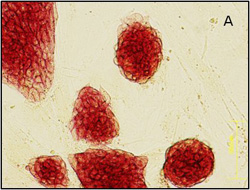Reprogramming cardiac cells
The ability of nearly all somatic cells to artificially become pluripotent stem cells (induced pluripotent stem (iPS) cells) through the enforced expression of four transcription factors has revolutionised stem cell biology. The most appropriate system for generating iPS from various cell types has been the focus of extensive research. The scientific aim of the EU-funded ‘Improved gene transfer system to iPS cells in mouse’ (Induvir) project is to improve current knowledge on the generation, maintenance and characteristics of iPS cells focusing on their differentiation towards cardiac cell lineages. Scientists have generated various DNA constructs for reprogramming of mouse somatic cells into iPS by minimal integration into the host genome. For this purpose they have used a non-viral, transposon-mediated approach or excisable lentivirus-based vectors. Successful generation and characterisation of iPS cells has so far been achieved from different mouse genetic backgrounds. These cells have been verified to behave like embryonic stem cells and the aim is to optimise the conditions for directing them towards the cardiac differentiation pathway after removing the reprogramming cassette from the iPS cells. The Induvir project findings are expected to contribute significantly towards cell therapy for the treatment of heart diseases. The developed technology has the capacity to generate therapeutically safe iPS cells from the patient’s own cells, thereby preventing rejection.



